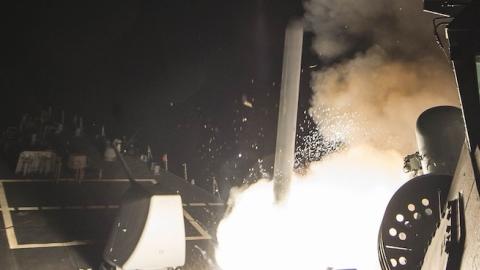Last night, President Trump ordered cruise missile strikes against Syrian government targets believed to have carried out the chemical weapons attack against civilian areas of Khan Sheikhoun in rebel-held Idlib in northwest Syria. Fifty-nine Tomahawks were launched against the Al Shayrat air base in Homs province from the destroyers USS Porter and USS Ross, currently stationed in the eastern Mediterranean. The Pentagon said it was still assessing damage, but early reports indicate that the airfield's planes and support infrastructure were severely damaged or destroyed.
The missile strikes are the first direct U.S. military action against the Syrian government. In a brief statement to the media, President Trump defended the attack partly as punishment for the deaths of innocent civilians—specifically children—but more pointedly as the reinforcement of a norm that he suggested his predecessor failed to uphold. "It is in the vital national security interest of the United States to prevent and deter the spread and use of deadly chemical weapons," Trump said during brief remarks announcing the strikes. "There can be no dispute that Syria used banned chemical weapons, violated its obligations under the Chemical Weapons Convention, and ignored the urging of the U.N. Security Council."
Russia was warned of the strikes in advance as part of what have become a regular channel of deconfliction communications between U.S. and Russian forces in Syria. According to Defense One, there were Russian bombers at the base, but the strikes gave a wide berth to these aircraft.
It will be interesting to see how the "Manchurian candidate" narrative about the President fares going forward. The most deranged paranoids on the Left are sure to see some kind of five-dimensional chess game being played here, wherein Trump acts against Russia's interests in Syria, Putin blusters, but the puppet strings remain in place. Others will no doubt accuse Trump of ordering the attack simply to change the subject from the serial failures of the early days of his Presidency. Ironically, Vladimir Putin himself has provided a draft of those talking points, accusing the United States of attacking under false pretenses, primarily as a means of changing the subject: "an attempt to divert the attention of the international community from numerous civilian casualties in Iraq."
Back in the real world, however, the strike was being read for what it is: a demonstration that this Administration is less reluctant to use force than the one that preceded it. And though Russia was the big power most directly challenged by the strike, Putin was perhaps not even the primary intended recipient of the message. The strikes occurred just as President Trump was having dinner with Xi Jinping of China, and, according to AFP, Trump delivered the news to Xi personally. The subtext was unmistakeable: Get serious about North Korea; our recent threats were not idle. Don Corleone himself couldn't have set a better table.
Reports coming out of the White House ahead of the strikes indicated that Trump was consulting primarily with Secretary of Defense James Mattis. Mattis is a strategic thinker, and establishing a precedent about the use of force is something that he would be very likely to counsel. It's also important to note that shortly after the attack, Secretary of State Rex Tillerson cautioned that it shouldn't necessarily be seen as a dramatic about-face on Syria policy, implying that regime change may not be in the cards.
For his part, Putin complained that the attack "substantially impairs Russian-U.S. relations, which are in a deplorable state as it is." The Russian Ministry of Defense vowed to upgrade Syria's air defenses as soon as possible and immediately suspended its de-conflicting agreement with the United States. If Putin leaves it at that, we're at a new normal that's probably not that much different than the old, but with an important message sent. If he escalates further, all eyes will be on Team Trump. Precedents, after all, require follow-through.




















